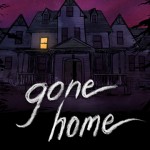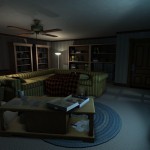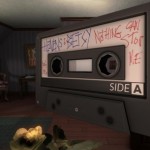SPOILERS: There are many. If you’re foolish enough to fear spoilers, don’t read this. YE BEEN WARNED.
 So, Gone Home is a video game. Maybe you’ve heard of it, either because of its shocking nature as a first-person game created by some of the folks who worked on Bioshock that doesn’t have any guns, monsters, or action gameplay of any kind, or because of it’s storyline involving a teenage girl realizing she is gay and finding her first love. Or maybe you haven’t heard of it, because unlike me you have better things to do.
So, Gone Home is a video game. Maybe you’ve heard of it, either because of its shocking nature as a first-person game created by some of the folks who worked on Bioshock that doesn’t have any guns, monsters, or action gameplay of any kind, or because of it’s storyline involving a teenage girl realizing she is gay and finding her first love. Or maybe you haven’t heard of it, because unlike me you have better things to do.
So, if you haven’t heard of it, here’s the basic rundown: It’s first-person, as I said, so you see everything as if you were there walking around. You do have a character, a college-age girl home from a year abroad in Europe only to discover the new house your family moved into is empty, your family missing, and all sorts of mysterious clues scattered everywhere. The point of the game is to figure out where your family is.
 Here I will spoil it all for you, because I must: You slowly discover, after wandering the house and finding keys and newspaper clippings and concert tickets and listening to audio journals your kid sister left behind, that your parents are off at couples counseling and your little sister has run away with her girlfriend.
Here I will spoil it all for you, because I must: You slowly discover, after wandering the house and finding keys and newspaper clippings and concert tickets and listening to audio journals your kid sister left behind, that your parents are off at couples counseling and your little sister has run away with her girlfriend.
That’s it.
In other words, presumably in the game’s universe your parents return the next morning, y’all call the cops on your sister, and a few hours later she’s being yelled at extensively.
 Now, see, I don’t object to the lack of action game dynamics here – I personally love exploration games like this. I would have liked to see more puzzles – there are almost none in Gone Home – but I can live without puzzles if there’s a good story being pieced together. And lord knows I don’t object to the LBGT aspect of the story. Good for virtual Sam finding her lesbian groove and all that. What I object to is the godawfulness of the story.
Now, see, I don’t object to the lack of action game dynamics here – I personally love exploration games like this. I would have liked to see more puzzles – there are almost none in Gone Home – but I can live without puzzles if there’s a good story being pieced together. And lord knows I don’t object to the LBGT aspect of the story. Good for virtual Sam finding her lesbian groove and all that. What I object to is the godawfulness of the story.
As others have pointed out, there’s another story – the “C” storyline after Sam’s and your parents’ – that’s potentially more interesting: Your Great Uncle Oscar, whose death bequeathed the house to your father, closed his business and became a recluse 30 years before under unusual circumstances. There’s some reason to think he’s haunting the house, in fact. While his story is never explicitly spelled out for you, you can put some of it together from context (this game excels at contextual clues): Uncle Oscar probably molested your father thirty years before, and felt such shame that he closed his business and locked himself up in his house for the last three decades of his life.
 It all comes to naught: There is no haunting; all the ghost stuff is teenage fun between Sam and her girlfriend. It’s just a lark. The entire story is literally that your parents went off to couples counseling, your sister ran away from home, and you came in a day early and no one knew to expect you. Everything else is just atmosphere and misdirection.
It all comes to naught: There is no haunting; all the ghost stuff is teenage fun between Sam and her girlfriend. It’s just a lark. The entire story is literally that your parents went off to couples counseling, your sister ran away from home, and you came in a day early and no one knew to expect you. Everything else is just atmosphere and misdirection.
And I can handle that. If the story was great, I could be happy with that. There’s a point near the end of the game when you finally locate a key to the attic door and go up there. It’s ringed in red Xmas lights and its creepy as hell. And at that moment, if something Great had happened, I would have been ready to be blown away by it.
Nothing great happened.
Now, to be fair, if this were a novel there would likely be all sorts of amazing writing, perceptive observations, turns of phrase, and amazing imagery that would carry this through. And maybe it could be argued that the amazing level of graphical detail in this game is on par with that. I mean, you get the feeling you know these people despite there being zero Non-Player Characters in the game – you meet no one, speak to no one, interact with no one – and that is quite a feat. There are whole cassette tapes of music (the game is set in 1995, most likely because the game’s creators grew up in that decade, and also to avoid the cell phone problem – I mean, if you had a cell phone, why not just call your Mom’s cell, or your sister’s, and ask what’s going on? Total gameplay time: One minute. But I digress.), zines, magazine covers, school assignments, letters, postcards, vinyl records, books – I mean, the level of detail in this game is impressive.
And that’s why I don’t really buy the graphics and detail being the same as writing in a novel – because there is a lot of bullshit in this game. For example, you can pick up a lot of things, like tissue boxes. You can pick up like a dozen tissue boxes as you walk around. None of them do anything or mean anything. They are just there – possibly to make you think you can do something with them in a complex attempt at misdirection that gets old really, really fast.
So yes: Impressive detail. Very empty detail in some ways. And so I must grade the story in Gone Home as Suck.
Which is too bad. The same bones of story could have been dressed up into something really affecting and interesting – and not necessarily with suicide and doom and ghosts. Just something more than the simplistic story we got.
If Gone Home were $5 I’d recommend you buy it and play it just to experience it – it is well done, in many technical ways. For $20 I think you can wait a year or two – or wait for someone else to come along and take the same basic idea and do something truly great with it.

Gotta agree, for the most part. I liked the slow reveal, but the end was sort of just there. Though I was actually fearful by the end I’d get to the attic and find out Sam had killed herself in grief.
When I finished it (in less than 3 hours), I was thinking how neat it would work as an engine for a series of interactive murder mystery stories. Something with more meat to the plot.